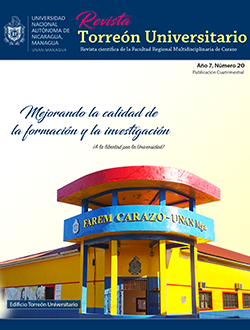Factors that affect the quality of life of the retiree
DOI:
https://doi.org/10.5377/torreon.v7i20.8573Keywords:
labor activity, social support, quality of life, centrality of the Retired, transition, workAbstract
Retirement involves a major restructuring of the functions that define the space of a person's life and, therefore, requires flexibility and adaptability to the new conditions. “Retirement can be seen as a transition that involves the extension, redefinition and change of roles. The extension of the time for retirement, it is an event that will allow a temporary process and that requires making decisions, implementing and carrying the consequences”. The centrality of work in relation to other elements, such as the family, in the definition of self-awareness is very different from one person to another, which implies that the transition to retirement may require different levels of self-restructuring.
The pre-retirement preparation stage coincides with a progressive clarification of attitudes about retirement and a planning of the time and manner of retirement from working life. At the time of retirement, the plans are more detailed, but the attitude tends to degenerate into anxiety and despair over the loss of their work activity. Of course, the retirement preparation phase has a different personal meaning depending on the individual history and the centrality of the work activity performed. Retirement means the loss of social contacts, but the degree of loss is still unclear, both in terms of the extension of the social network, as well as the quality of support received. Social support should be considered to distinguish the different sources (family, friends, etc.) and the different types of social support (emotional, instrumental, etc.) that affect the quality of life of the retiree considering the aspect of the physical activity, health, education, food, intellectual activity, psychosocial activity among other factors or important aspects in the retiree.
Downloads
Downloads
Published
How to Cite
Issue
Section
License
Los autores que publican en esta revista están de acuerdo con los siguientes términos.
- El autor o los autores de los artículos, ensayos o investigaciones conceden a la Universidad Nacional Autónoma de Nicaragua, Managua (UNAN-Managua) los derechos de edición (copyright) del trabajo enviado, por consiguiente la Universidad cuenta con el derecho exclusivo para publicar el artículo durante el periodo completo de los derechos de autor.
- Estos derechos de autor/ autores autorizan a la Revista Torreón Universitario y a la Universidad editar y divulgar/publicar el artículo en dicha Revista, incluyendo reproducción impresa y electrónica, el almacenamiento, recuperación y cualquier otro tipo de publicación, y fuentes de información secundaria como servicios de resúmenes y bases de datos, así mismo la facultan a proteger el artículo contra el uso no autorizado para su difusión por medios impresos o electrónicos (PDF, HTML, EPUB, XML u otros).
Licencia para el uso del contenido
La revista hace uso de la Licencia Creative Commons Atribución-NoComercial-SinDerivar 4.0 Internacional.
Bajo esta declaración:

Este revista está sujeta a una licencia de Creative Commons Reconocimiento-NoComercial-SinObraDerivada 4.0 Internacional. Puede ser copiada, distribuida y transmitida públicamente siempre y cuando se cite al autor y la fuente (Revista Torreón Universitario), no debe modificarse ni utilizarse con ningún fin comercial. La licencia completa se puede consultar en http://creativecommons.org/licenses/by-nc-nd/4.0/.

